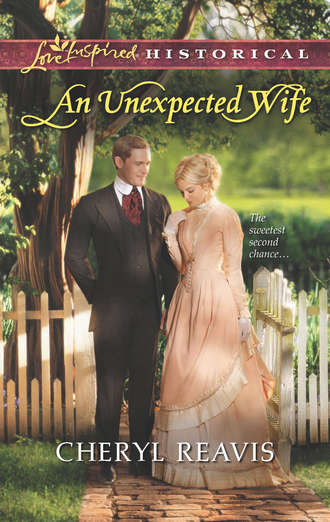
Полная версия
An Unexpected Wife
“My father— Do you know...what happened?” he asked after a moment.
“He was very ill. It was his heart,” she said. “They had to hurry the wedding on account of it—at his request, because he wanted to see Maria as a bride. And his doctors advised that there could be no delay.”
“My father approved of the marriage, then.”
“Yes. He was quite fond of Max, and he...” She hesitated, apparently uncertain as to whether he was up to hearing the details of his sister’s marriage to a Yankee colonel.
“Go on,” he said. “I need to know.”
“He made sure that Maria could live here as long as she wanted. It was in his will. He was worried that something might happen with the occupation and the house might be confiscated if Maria owned it. So he left it to Max. Your father trusted him to take care of her—they had long talks together about it. The ceremony was held here in the upstairs, the wide hallway right outside his room on the other end of the house. He could see and hear everything. Maria looked beautiful—she wore the earrings you and Samuel gave her before you left for the war—”
“We thought she would marry Billy Canfield. Where is he? Why didn’t she?”
“You would have to ask her about that,” Kate said.
“My father was pleased about her marrying your brother,” he said. It wasn’t a question, but the whole idea of such a thing was hard for him to believe.
“Yes. He was. I think it was a very enjoyable day for him. Lots of food and drink and good company, and I’m certain he sneaked at least one cigar.”
Robert smiled briefly at hearing that his father’s love of cigars had never waned. At least he had had something pleasant to focus on at the end of his life. “An enjoyable day. That’s good. I’m...glad.”
“I liked Mr. Markham very much,” she said after a moment. “We would talk sometimes.”
“Did he ever—” He suddenly stopped, unable to bring himself to ask the question.
“What were you going to ask?”
“I— Nothing.”
“He spoke of you once,” she said, and once again he thought she was trying to second-guess what he might want to know.
“He said you were his warrior son. And Samuel, his poet.”
Robert looked away. He had thought he was ready to hear these things, but he wasn’t. Had he not been such a hotheaded “warrior,” Samuel might be alive today.
He forced himself to push the conversation in a different, but no less painful, direction.
“The colonel—isn’t here?” he asked.
“He and Maria and the boys left for New Bern three days ago.”
“Boys? There are...children?”
“Three. Two are adopted. One, the youngest, is their birth child. My brother had military business to attend to in New Bern and he wanted his family with him. And Mrs. Hansen.”
He looked at her sharply. “Mrs. Hansen?”
“She helps Maria with the children. The boys are quite a handful.”
“You’re talking about Warrie Hansen?”
“Yes. You would know her, I think.”
“I did,” he said. “A very long time ago.”
So, Robert thought. Now he knew where he could find Eleanor’s mother at least.
“How...long have I been...?” He couldn’t quite find a word to describe his current condition. He felt as if he had slept a long time, but he didn’t know why or how. He reached up to touch his forehead again. It still hurt.
“You arrived the day they all left,” she said.
“Poor...timing on my part. Or perhaps not,” he added after a moment, primarily because of the look on her face.
“Given the circumstances,” Kate said, “it would have been alarming for Maria to suddenly come upon you the way I did, but, given the state that you were in that day, I think it would have been even worse. When you fell in the hallway, you hit your head on the parquet floor. Hard. The army surgeon says your collapse was caused by hunger and exhaustion from trying to travel on foot through the deep snow. That, and the wound you received, I assume, at Gettysburg. He says it left you—”
“I know how it left me,” Robert said. He lived with the pain every day and with being less than he’d once been both physically and mentally. He was thirty-three years old, and he felt like an old man.
But he suddenly remembered. “Mrs. Kinnard was there—when I was on the floor.”
“Yes,” she said.
“I remember...bits of it. She was upset with me. It was like...when the Canfield brothers and I tipped over...one of her outhouses.”
She looked at him with raised eyebrows. “I can see why Maria thinks Robbie may demonstrate a mischievous streak when he’s older.”
“Robbie?”
“Max and Maria’s little boy. He’s named for you. The other two, Joe and Jake, are Suzanne and Phelan Canfield’s sons. Max adopted them after she died.”
Robert closed his eyes, his mind reeling. A nephew named after him? Suzanne Canfield dead? And Eleanor. What had happened to Eleanor?
“I shouldn’t be in here,” she said suddenly. She moved quietly to the door, opening it slightly and peering into the hallway for some sign of Mrs. Kinnard.
“I think you should rest,” she said over her shoulder. “The night you arrived, you were in no condition to either get or give explanations. You’re better now, and you’re going to need all the strength you can muster if you intend to try to make Maria understand why you did what you did. I don’t think it will be easy. I know how I would feel if I were in her place and Max had suddenly come back from the dead. Truthfully, I don’t envy you the attempt.”
Robert didn’t say anything. She was quite straightforward, this new sister-in-law of his.
“I have a favor...to ask,” he said, despite the inappropriateness of doing so. “Two favors.”
“All right. Ask.”
“Would you tell the sergeant major that I’d like to talk to an army chaplain. Tell him I want to talk to one who has seen the elephant. Someone who’s fought in battle and survived. Will you do that?”
“Yes,” she said without hesitation.
“And I would consider it a kindness if you would find out whatever you can about Miss Eleanor Hansen—where she is.”
He expected her to ask him for explanations, but she didn’t. She nodded, and after one final cautious look into the hallway, she slipped away.
Chapter Four
What is wrong with me? Kate thought as she made her way to the kitchen. Hiding from a woman she had every right to challenge in her own brother’s house. It wasn’t like her to hide. Keep silent, yes. Endure, yes. But not this.
She gave an exasperated sigh. She knew perfectly well that it wasn’t the hiding alone that had her so disconcerted. It was that she had willingly engaged in a prolonged conversation with a strange man—albeit a relative by marriage—in his—her—bedchamber.
She wasn’t really certain why she’d tarried so long with Robert Markham—except that he wasn’t like any man she’d ever met. He was literally her enemy, of course, an active participant in the war responsible for Grey’s death and for Max’s nearly fatal imprisonment, and yet there was something...else about him, something she couldn’t begin to define. Perhaps it was the contrast between his rough physical appearance and his quiet demeanor. Or seemingly quiet demeanor. Even that was an intriguing puzzle to her. His eyes weren’t quiet at all. They were so intense and intimidating—a look she thought he might have perfected in the prizefighting ring.
And yet he’d seemed perfectly willing to have her take refuge from Mrs. Kinnard at his inconvenience. She had immediately sensed that he would have given her whatever help she had required, if he could, whether he knew her or not. She decided that perhaps it was the knight-in-shining-armor quality Southern men were purported to have, but she had no experience in that regard and therefore couldn’t possibly know with any certainty. All she knew of the group as a whole was what Maxwell and Grey had both told her—that they were worthy enemies and excellent horsemen, things soldiers—cavalrymen—apparently found time to note and admire despite their determination to kill one another.
“It is Tuesday,” Mrs. Kinnard suddenly announced behind her, once again making Kate jump. And the woman made it sound as if Tuesday was a very bad thing to be.
Kate waited as patiently as she could to be enlightened, but so did Mrs. Kinnard. And the impasse it created continued to the point where poor timid Mrs. Justice and the two orderlies who would have walked past them in the downstairs hallway immediately changed their minds and went back in the direction they had just come.
“How may I help you, Mrs. Kinnard?” Kate said finally, capitulating once again for Max’s sake. But it wasn’t just her need to keep the peace that made her try to be agreeable. She couldn’t help but think of Mrs. Russell’s lost son, and she intended, by keeping Mrs. Kinnard pacified, to be able to write her letter to Harrison at some point without interruption, a very long letter, whether John’s parents would interpret it as intruding into his life or not.
John’s parents.
She never thought of the Howes as Harrison’s parents.
There was a good chance that the trains would be running again after the heavy snow. If so, she wanted to make sure her letter would go out today. Her son was still in this world, and even if she couldn’t be with him, couldn’t see him, she could still have written contact and through his return letters know how he fared.
“I have had no communication from your brother,” Mrs. Kinnard said, interrupting Kate’s thoughts. “None. I should have heard from him by now.”
“I’m afraid I couldn’t say why you have not, Mrs. Kinnard. Perhaps the heavy snow has brought the telegraph lines down—or some other...incident regarding the telegraph has occurred,” Kate added with enough significance to make her point. Diehard Rebels were still known to disrupt the telegraph messages in any way they could, and Kate had no intention of taking the blame for that or the weather. “Whatever the reason, he won’t return until his military duties are satisfied.”
“Well, I need to hear from him,” Mrs. Kinnard said, clearly not placated by mere logic.
“And I’m sure you will. When he is able.”
“And if Robert Markham dies without seeing Maria? What then?”
“He’s awake now,” Kate said. “Perhaps he won’t die.”
“Awake? Why was I not told!”
“I’ve just told you, Mrs. Kinnard. And I’ve carried out his request—”
“What request?” Mrs. Kinnard asked, immediately seizing on the remark as if something underhanded was afoot. And her tone suggested that she already knew she wasn’t going to be happy with Kate’s answer.
“He’s asked to see the army chaplain—I’ve just advised Sergeant Major Perkins,” Kate said—or tried to.
“What utter nonsense! Robert Markham has his own pastor! If it’s spiritual comfort he needs, I can send for Mr. Lewis right now!”
Mrs. Kinnard made an abrupt about-face and headed toward the main staircase—apparently because she suddenly realized she could go directly to Robert Markham’s room and have this whole matter straightened out in no time.
Kate watched her go, feeling more than a little guilty that she’d unleashed the woman upon him without warning. Unlike Kate, he couldn’t hide.
But the sergeant major intercepted Mrs. Kinnard at the bottom step and stood firmly between her and her obvious desire to ascend.
“I will see him, Mr. Perkins,” Kate heard Mrs. Kinnard say.
“Yes, ma’am, you will. But not now. He’s asked to talk to the chaplain and with us not knowing how much strength he’s got at the moment, he’s not going to use it up on anything but that.”
“She says he has asked for your chaplain,” Mrs. Kinnard said, swinging her arm around to include Kate.
“Yes, ma’am. He has.”
“Well, I don’t believe it! Clearly, he’s not himself.”
“Just the same, he’s not going to be bothered until after we get him the kind of chaplain he says he wants—”
“And what kind is that, pray tell?”
“He wants one who’s seen the elephant. He’s the colonel’s brother-in-law so that’s what he’s going to get. In the meantime nobody is going to be seeing him but the hospital orderlies assigned to look after him. I saw that tongue-lashing you gave him when he was down on the floor, Mrs. Kinnard. He doesn’t need any more of that. He is going to be just as calm and rested as he is right now when the chaplain gets here. After that, then we’ll see.”
“Indeed we will!” Mrs. Kinnard said. “You should be mindful that Robert Markham is one of our people. He’s not yours to direct as you please. Elephants, indeed!”
“And I remind you, ma’am, who won this war. It would be better for us all if you went somewhere and waited until I send for you. And right now, if you please. I don’t want to take exceptional measures, but I have the authority to do just that if I see fit.”
Kate stayed well out of the set-to, advancing only after Mrs. Kinnard had turned on her heel and headed for the dining room in a huff.
“How is it I have to maintain the peace for my brother’s sake and you don’t?” she asked the sergeant major.
“I am maintaining the peace, Miss Kate,” Perkins said.
“It sounded more like you might shoot her.”
“What I’m doing is trying to make sure that Mrs. Colonel Woodard finds her brother in the best state of mind and health possible when she gets back here. I’m thinking Mrs. Kinnard isn’t going to be much help when it comes to either of those things. And I’m thinking if the colonel’s lady is happy, then the colonel will be too. Which means, so will I. And probably you, too,” he added for good measure. “If you remember, he’s not going to be expecting to find you in the middle of all this.”
Kate frowned at his annoyingly perfect logic. No. Max definitely wouldn’t be happy that she wasn’t where she was supposed to be. “As much as I hate to admit it, I think I have...things to learn, Sergeant Major,” she said.
Sergeant Major Perkins was only too happy to take her at her word. “Yes, Miss Kate, you do,” he said without even a token regard for her feelings. “For example, now would be a good time for you to go and apologize to Mrs. Kinnard for my very disrespectful behavior. Tell her your brother will hear of it, after which I’ll be disciplined accordingly.”
“I don’t see how that will help.”
“As you said, you have things to learn. It’s time to start learning. If you please,” he added respectfully.
“I am not going to lie, Sergeant Major,” she said, despite having lived in a huge web of untruths for more than half her lifetime. The fabrication regarding Harrison’s birth had been foisted upon her; she’d had no choice. In this matter she did.
“There is no lie in what I want you to do. I gave you the easy part. It’s going to be harder to get the colonel’s brother-in-law the chaplain he’s asked for. It might take a while. We have to find him and then we’re likely going to have to sober him up. The man gets into the O Be Joyful every chance he gets.”
Kate frowned. “Then I don’t think he’s going to do.”
“He’s the only one we got who fits the bill,” Perkins said matter-of-factly. “What would be very helpful now is for you to go and mend the fence I just knocked down. If you please,” he said again, tilting his head in the direction Mrs. Kinnard had gone.
She didn’t please. She didn’t please at all. But she went.
“Miss Kate,” he called as she reached the dining room door. “The company baker has made up a big batch of those shortbread cookies you like so much. They’re locked in the pantry. Maybe you and the ladies would like some of them. They’d go nice with a pot of tea.”
“You are bribing me with cookies,” she said incredulously.
“That I am, Miss Kate.”
She shook her head in exasperation, then took a deep breath before she opened the dining room door and went in. She was surprised to find Mrs. Justice and Mrs. Russell sitting at the long mahogany table, as well.
And the gathering felt more like a planned meeting than a happy coincidence. She wondered if she was to have been included, if that was the reason Mrs. Kinnard had been so determined to find her.
“What are you doing here?” Mrs. Kinnard said immediately, her rudeness causing Mrs. Justice to make a small sound of protest.
“This is my brother’s house,” Kate said calmly. “And if by here, you mean this room, I...wanted to ask if you might like some tea and shortbread cookies while we wait for Mr. Markham to see the chaplain—”
Mrs. Kinnard bristled at the mention of the clergyman she hadn’t approved.
“Robert Markham has his own pastor, one who has known him since he was a boy,” she said. “I can’t imagine why he would want anyone else.”
“He didn’t say why. I believe he wants to speak to someone of faith, but he also wants someone who has been in battle, as he has. That’s what ‘seeing the elephant’ means, that one has fought the enemy and survived.”
The women looked at each other. Mrs. Kinnard must have more questions, but apparently she had no intention of asking Kate.
“I would like some tea,” Mrs. Justice offered timidly from her seat at the far end of the table. “And cookies. I dearly love cookies. Mrs. Russell and Mrs. Kinnard do, too.”
“I have no interest in...cookies,” Mrs. Russell said, but Kate heard “her cookies.”
“Nor I,” Mrs. Kinnard assured her.
“Of course you do,” Mrs. Justice said, stopping just short of blatantly insisting. “Remember when all three of us got into trouble for eating the cookies that were left cooling on the windowsill at old Mrs. Kinnard’s house? I can still smell that wonderful aroma after all these years. Don’t you remember? We were all three riding on my brother’s decrepit old brindled mare. We got a whiff of those cookies and off through the spirea hedge we went. And we made the poor old nag go tree to tree and shrub to shrub until we got close enough to snap those cookies up—I don’t know what that horse must have thought. Now these cookies we won’t have to...um, borrow.”
Incredibly, Mrs. Russell smiled. “We did do that, didn’t we?”
“I don’t recall any such thing,” Mrs. Kinnard said. “The very idea. I certainly never took cookies from my mother-in-law’s windowsill.”
“Oh, for heaven’s sake, Acacia,” Mrs. Russell said. “She wasn’t your mother-in-law then. We were only seven. You do remember being seven, I hope.”
“Six,” Mrs. Justice said. “And already well on our way to a highwayman’s life—just as soon as we got a better horse.”
Mrs. Justice and Mrs. Russell looked at each other, then burst out laughing, and Kate couldn’t keep from smiling. Mrs. Kinnard, however, remained unmoved.
There was a polite knock—kick—on the door, and Kate went to open it. A young soldier stood in the hallway, struggling to hold on to a large silver tea tray laden with a matching teapot and a mound of cookies and mismatched china cups and serving plates.
“Sergeant Major Perkins asks if you would like tea and cookies, Miss Woodard,” he said as if he’d rehearsed the line any number of times. Clearly, Perkins wasn’t taking any chances that Kate wouldn’t carry out his plans for fence mending.
“Do we?” Kate asked, looking over her shoulder at Mrs. Kinnard, giving her the final word.
“Wouldn’t it be rude not to accept Miss Woodard’s hospitality?” Mrs. Justice said behind her hand to Mrs. Kinnard—as if Kate couldn’t hear her. “I believe all three of our mothers taught us how to behave in someone else’s home, no matter what the circumstances might be.”
“Oh, very well,” Mrs. Kinnard said, clearly exasperated. “Since it’s here. Bring in the tray,” she said to the soldier. “Put it there. Will you pour or shall I?” she asked, clearly startling him to the point that even she realized it.
“Good heavens! Not you,” Mrs. Kinnard snapped—to the young soldier’s obvious relief. “Her.”
“I would much prefer that you poured, Mrs. Kinnard, if you would be so kind,” Kate said, assuming that she was the target of Mrs. Kinnard’s remark. “Unfortunately I haven’t had that much practice. My mother always chose to use the Woodard heirlooms rather than storing them, and she was always worried I would break something—with good reason.” She was telling the truth, but she was also trying to do as Perkins wanted and lay some groundwork before she made an attempt to soothe Mrs. Kinnard’s decidedly ruffled feathers. Besides that, she wanted to focus her attention on what was happening upstairs with Robert Markham.
“Indeed,” Mrs. Kinnard assured her. Believing that a catastrophe would be imminent if anything breakable found its way into Kate’s hands was clearly no hardship for her at all.
Mrs. Kinnard frowned at the mismatched cups and saucers on the tray, and for a moment Kate thought she was going to comment on it. But then she must have remembered what had likely happened to the set. “Maria went to such great trouble to hide her mother’s things when the house was looted,” she said. “We must do our best to preserve her tea service, after all.”
“My thoughts exactly,” Kate said, smiling. She understood perfectly that she was supposed to cringe at the insinuation that she had political and regional ties to the looters, and that as a hostess, she left much to be desired. But being able to preside over the pouring of tea didn’t matter to her in the least and hadn’t since Harrison was born. She gave a soft sigh at the sudden thought of him. She wanted desperately to be away from Mrs. Kinnard and the others so she could at least write to him. She had been so faithful in her correspondence to him that she liked to think he might even anticipate the arrival of her letters. She always tried to make them as interesting as she could in the hope that he would look forward to the next one. Perhaps she would tell him about the strange return of the man upstairs.
The tea pouring proceeded in silence and without mishap.
“Tell me, Mrs. Justice,” Kate said at one point in an attempt to foster enough mild conversation to carry out her mission. “What other adventures did you have when you were a little girl?”
Mrs. Kinnard gave her a warning look. She clearly didn’t want any more disclosures regarding her childhood. Kate tried not to smile again at the mental image of the three of them riding an ancient horse and trying to make it to those cookies on the window ledge without being seen. Somehow she couldn’t get past imagining them dressed just as they were now.
But Mrs. Justice was saved having to answer by a loud commotion in the foyer. Kate thought for a moment that Mrs. Kinnard was going to get up and go see what was occurring for herself, lest the chaplain get by her without her having the opportunity to give him both his instructions and her opinion of his being brought here in the first place.
“Well, how drunk is he!” they all heard Perkins say.
Kate couldn’t make out the reply. She worked on looking as if she had no idea what that comment might mean.
“Get him in here and sober him up! Stick his head in a bucket of snow if you have to!”
“Soldiers do seem to have unusual solutions to their predicaments, don’t they?” Mrs. Justice commented mildly as the commotion intensified and moved past the dining room door toward the back of the house. She took another sip of tea and looked at Kate. “What did Robbie say, my dear? Did he mention where he’d been at all?”
“I didn’t ask him anything about that,” Kate said.
“Oh! Of course not,” Mrs. Justice said, apparently alarmed that she’d dared suggest such a rude and thoughtless thing. “That wouldn’t have been a good idea at all. But you did talk to him?”
“He had...questions. He didn’t seem to remember what had happened to him.” She took a quiet breath. “He didn’t know his father had died.”
“Oh, that poor, poor boy,” Mrs. Justice said.
“And did he know about Maria’s marriage?” Mrs. Kinnard asked.
“No. He didn’t.”
“I’m sure he was upset about that, as well.”
“He is Maria’s brother. He would naturally be concerned about her. Fortunately I could reassure him.”
“Indeed yes,” Mrs. Justice said. Mrs. Kinnard and Mrs. Russell both gave her a hard look.






